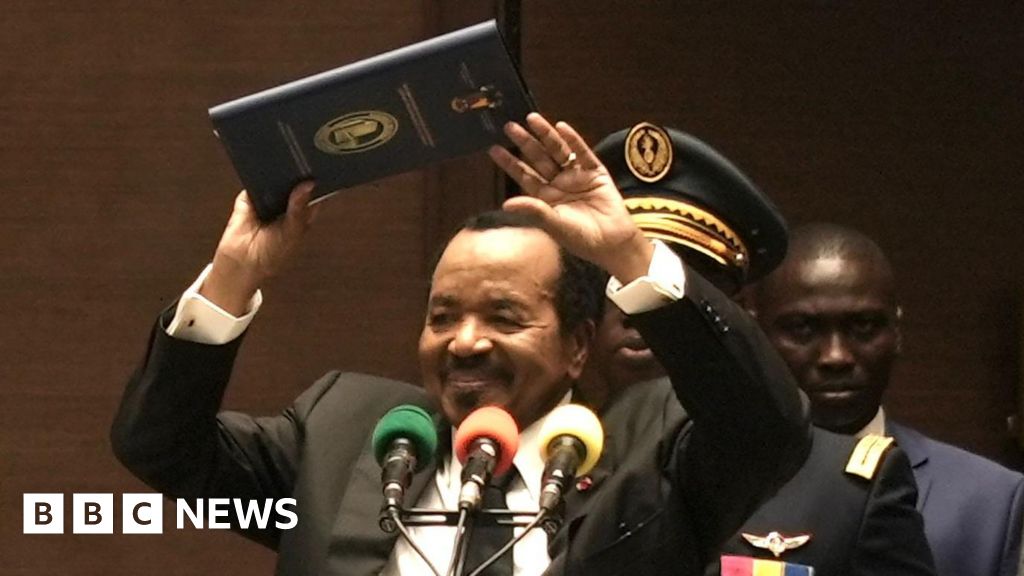World’s oldest president sworn in for eighth term in Cameroon

Cameroon's Biya, World's Oldest President, Sworn In Amidst Post-Election Unrest
Yaoundé, Cameroon - Paul Biya, aged 92 and the world's oldest president, has been sworn in for an eighth consecutive term as President of Cameroon. The inauguration comes in the wake of disputed election results and ensuing violence that has gripped the nation. In his inaugural address delivered at the parliament in Yaoundé, Biya pledged to restore order and offered condolences to victims of the recent unrest.
Election Dispute and Violent Aftermath
The October election saw Biya declared the winner with 54% of the vote, while his main challenger, Issa Tchiroma Bakary, secured 35%. Tchiroma Bakary has vehemently rejected the results, alleging widespread fraud and calling for sanctions against Cameroonian officials. The announcement of Biya's victory triggered widespread protests, resulting in clashes with security forces. According to the National Human Rights Commission, at least 14 people have been killed and over 1,200 arrested. Other sources suggest the death toll may be significantly higher.
Biya, in his speech, acknowledged the protests but placed blame on "irresponsible politicians" for inciting unrest. He praised the electoral body, Elecam, for conducting what he deemed a satisfactory electoral process, despite the allegations of fraud. He also commended the security forces for containing the protests, though he did not address concerns about the excessive use of force.
Promises and Challenges Ahead
Despite the controversy surrounding his re-election, Biya urged citizens to unite and work towards building a "united, stable, and prosperous" Cameroon. He promised to prioritize issues affecting women and young people and reiterated his commitment to tackling corruption and security challenges that have plagued his administration for decades.
Prior to the inauguration, Tchiroma Bakary called for a general strike, which crippled several parts of the country, particularly his strongholds of Garoua and Douala. He has vowed to continue resisting until his "victory" is recognized and has implored foreign powers to intervene.
A Legacy of Long Rule
Paul Biya's ascent to power began in November 1982, following the resignation of President Ahmadou Ahidjo. He has since maintained a firm grip on power, leading to criticism from human rights groups and opposition figures who accuse him of authoritarianism. His long tenure has coincided with periods of economic hardship, political instability, and ongoing conflicts, including the Anglophone crisis in the Northwest and Southwest regions of Cameroon.
Expert Analysis
"Biya's continued rule reflects a pattern of entrenched power dynamics in many African nations," says Dr. Akosua Ampofo, a political science professor at the University of Ghana. "While stability is often cited as a justification for long tenures, it can also stifle democratic progress and create fertile ground for corruption and social unrest. The challenge for Cameroon is to find a path towards inclusive governance that addresses the grievances of marginalized communities and promotes genuine political participation."
Historical Context: Cameroon's Political Landscape
Cameroon's post-colonial history has been marked by political continuity and limited power transitions. The dominance of the ruling party, coupled with a fragmented opposition, has contributed to the consolidation of power in the hands of the president. The Anglophone crisis, which began in 2016, further complicates the political landscape, as secessionist movements continue to challenge the authority of the central government.
Current Challenges and Future Prospects
Looking ahead, Biya's government faces significant challenges, including addressing the root causes of the Anglophone conflict, combating corruption, and promoting economic diversification. The outcome of these challenges will determine the future stability and prosperity of Cameroon.
According to Joseph Tchemi, a Cameroonian economist, "The key to Cameroon's future lies in investing in human capital, promoting good governance, and creating a conducive environment for private sector growth. Addressing the grievances of marginalized communities and fostering national unity are also essential for sustainable development."
The Constitutional Council has dismissed eight complaints about the election, citing insufficient evidence of irregularities or a lack of jurisdiction to annul results. Tchiroma Bakary has refused to file an official complaint, maintaining his stance that the election was fraudulent.
Originally sourced from: BBC News Africa
